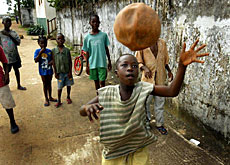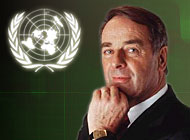UN approves Ogi’s resolution

2005 will be the United Nations Year of Sport, thanks to a proposal initiated by the former Swiss sports minister, Adolf Ogi.
The decision was announced by the UN General Assembly after a meeting in New York on Monday.
While Tunisia sponsored the resolution calling for physical education and stricter doping controls, the idea was actually the brainchild of Ogi, the UN’s Special Adviser on Sport for Development and Peace.
Its goal is to support the UN Millennium programme, which aims to reduce worldwide poverty by half by 2015.
Ogi said he was overjoyed at the news.
“It’s a historic day for sports. Sport may not be in the Champions League at the UN, but it’s gaining in standing,” said Ogi.
Switzerland has been supporting the resolution as a co-sponsor. It already promotes sport as a means of reducing poverty in projects it conducts in developing countries.
Part of the budget of the Swiss Agency for Development and Cooperation is earmarked for this purpose.
Ogi spoke to swissinfo ahead of the Monday meeting about the resolution.
swissinfo: Which parts of the resolution are the most important for you?
Adolf Ogi: The entire resolution tries to make the world a better, healthier and more just place. It is like a piece in a mosaic, which is incomplete without all the tiny pieces.
swissinfo: “Sport is a human right” – how are you hoping to get this message across?
A.O. : I personally do not have the power to get this across fully. A single individual could not do this. That’s why it’s necessary to have this resolution, so that a basic principle is recognised worldwide, that will force UN member states to let their kids play and do sports.
The member states will also be obliged to provide the necessary means to make sports lessons a part of the school curriculum, for example, and to furnish the materials required. It has to be recognised that a large number of families are too poor to even buy a ball for their children.
In poverty-stricken developing countries, play is often seen as a luxury and families frequently rely on child labour. This issue can be addressed by giving children the right to unfettered physical activity.
swissinfo: How can sport help to halve world poverty by 2015?
A.O.: Sport can help to reduce poverty. To illustrate this point, I would like to take an example from Switzerland that speaks volumes. It is a project that I know well because I helped to launch it.
Sport can also mean business. The Pakistani town Sialkot is well known for its sport-accessories industry, which employs thousands. In cooperation with Claro Fair Trade, the Swiss charity Helvetas produces hand-stitched footballs in small, supervised workshops. This is all done without child labour and on fair wages, which allow families to live on the salary of an adult.
This means workers attain a minimum standard of life. The children of these parents can go to school and learn skills that will serve them as adults and guarantee them an income. Their children will also go to school and so on.
swissinfo: Does Switzerland support your work financially?
A.O.: The Swiss government gives me a yearly budget of SFr370,000 ($271,000) which covers the salaries of my staff, travel and administrative costs. The UN has put a free office and infrastructure at my disposal in Geneva. I myself work out of conviction and am paid a symbolic wage of a dollar a year by the UN secretary-general, Kofi Annan. Our work is a form of networking and not organising projects, so the budget is sufficient.
swissinfo: You say that you spend 90 per cent of your working time for the UN – what do you do?
A.O.: I spend most of my time travelling to meet people and to launch projects. Like a wandering preacher, I have to explain to all and sundry everywhere that well-planned sporting initiatives can be a cost-effective and practical way of reaching the goals of development or peace projects.
That’s why children in Africa travel miles to get vaccinated if they know they can get a football or a game in return.
Similarly a clean sportsman like Zinedine Zidane, who says that drugs cause damage, is more likely to get the attention of young people than a doctor or a politician.
swissinfo-interview: Etienne Strebel
Adolf Ogi was born on July 18, 1942, in Kandersteg, canton Bern.
1964: Ogi joins the Swiss-Ski federation, becoming technical director in 1969.
1979: He becomes a parliamentarian in the House of Representatives representing the Swiss People’s Party.
1987-2000: Ogi becomes a government minister.
1993 and 2000: He is voted Swiss president.
2001: UN Secretary-General Kofi Annan names Ogi as Special Adviser on Sport for Development and Peace.
2003 The Swiss government names Ogi as special emissary during the run-up to the World Summit on the Information Society.

In compliance with the JTI standards
More: SWI swissinfo.ch certified by the Journalism Trust Initiative



You can find an overview of ongoing debates with our journalists here. Please join us!
If you want to start a conversation about a topic raised in this article or want to report factual errors, email us at english@swissinfo.ch.